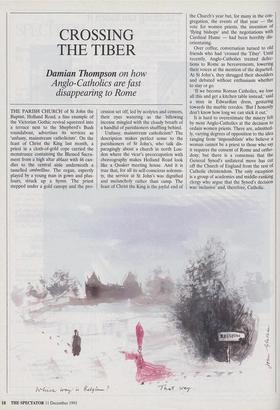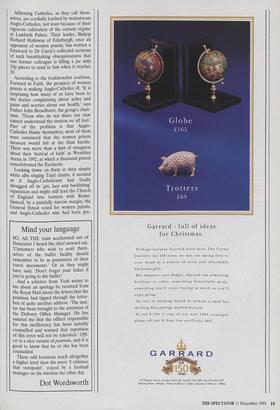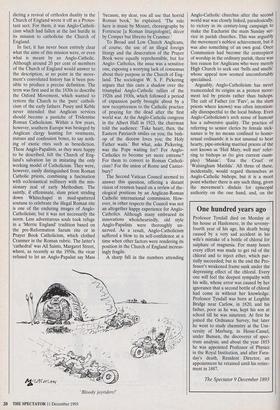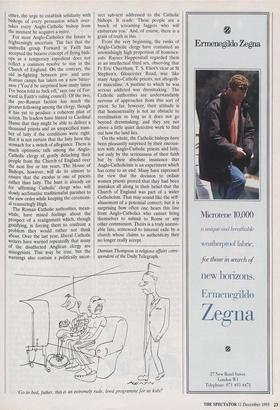CROSSING THE TIBER
Damian Thompson on how Anglo-Catholics are fast disappearing to Rome
THE PARISH CHURCH of St John the Baptist, Holland Road, a fine example of the Victorian Gothic revival squeezed into a terrace next to the Shepherd's Bush roundabout, advertises its services as `unfussy, mainstream catholicism'. On the feast of Christ the King last month, a priest in a cloth-of-gold cope carried the monstrance containing the Blessed Sacra- ment from a high altar ablaze with 46 can- dles to the central aisle underneath a tasselled ombrellino. The organ, expertly played by a young man in gown and plus- fours, struck up a hymn. The priest stepped under a gold canopy and the pro- cession set off, led by acolytes and censors, their eyes watering as the billowing incense mingled with the cloudy breath of a handful of parishioners shuffling behind.
Unfussy, mainstream catholicism? The description makes perfect sense to the parishioners of St John's, who talk dis- paragingly about a church in north Lon- don where the vicar's preoccupation with choreography makes Holland Road look like a Quaker meeting house. And it is true that, for all its self-conscious solemni- ty, the service at St John's was dignified and melancholy rather than camp. The feast of Christ the King is the joyful end of the Church's year but, for many in the con- gregation, the events of that year — the vote for women priests, the invention of `flying bishops' and the negotiations with Cardinal Hume — had been horribly dis- orientating.
Over coffee, conversation turned to old friends who had `crossed the Tiber'. Until recently, Anglo-Catholics treated defec- tions to Rome as bereavements, lowering their voices at the mention of the departed. At St John's, they shrugged their shoulders and debated without enthusiasm whether to stay or go.
`If we become Roman Catholics, we lose all this and get a kitchen table instead,' said a man in Edwardian dress, gesturing towards the marble reredos. `But I honestly don't know how long we can stick it out.'
It is hard to overestimate the misery felt by most Anglo-Catholics at the decision to ordain women priests. There are, admitted- ly, varying degrees of opposition to the idea ranging from impossiblists' who believe a woman cannot be a priest to those who say it requires the consent of Rome and ortho- doxy; but there is a consensus that the General Synod's unilateral move has cut off the Church of England from the rest of Catholic christendom. The only exception is a group of academics and middle-ranking clergy who argue that the Synod's decision was 'inclusive' and, therefore, Catholic. Affirming Catholics, as they call them- selves, are cordially loathed by mainstream Anglo-Catholics, not least because of their vigorous cultivation of the current regime at Lambeth Palace. Their leader, Bishop Richard Holloway of Edinburgh, once an opponent of women priests, has written a foreword to Dr Carey's collected sermons of such breathtaldng obsequiousness that one former colleague is filling a jar with 10p pieces to send to him when it reaches 30.
According to the traditionalist coalition, Forward in Faith, the prospect of women priests is making Anglo-Catholics ill: 'It is surprising how many of us have been to the doctor complaining about aches and pains and worries about our health,' says Father John Broadhurst, the group's chair- man. 'Those who do not share our view cannot understand the tension we all feel.' Part of the problem is that Anglo- Catholics blame themselves; most of them were convinced that the women priests measure would fall at the final hurdle. There was more than a hint of smugness about their 'festival of faith' at Wembley Arena in 1992, at which a thousand priests concelebrated the Eucharist.
Looking down on them in their simple white albs singing Taize chants, it seemed as if Anglo-Catholicism had finally shrugged off its 'gin, lace and backbiting' reputation and might still lead the Church of England into reunion with Rome. Instead, by a painfully narrow margin, the General Synod voted for women priests, and Anglo-Catholics who had been pre- dicting a revival of orthodox duality in the Church of England wrote it off as a Protes- tant sect. For them, it was Anglo-Catholi- cism which had fallen at the last hurdle in its mission to catholicise the Church of England.
In fact, it has never been entirely clear what the aims of this mission were, or even what is meant by an Anglo-Catholic. Although around 20 per cent of members of the Church of England would answer to the description, at no point in the move- ment's convoluted history has it been pos- sible to produce a precise definition. The term was first used in the 1830s to describe the Oxford Movement, which wanted to restore the Church to the 'pure' catholi- cism of the early fathers. Pusey and Keble never intended that Anglican services should become a pastiche of Tridentine Roman Catholicism. Within a few years, however, southern Europe was besieged by Anglican clergy hunting for vestments, statues and confession boxes, to say noth- ing of exotic rites such as benediction. These Anglo-Papalists, as they were happy to be described, felt the Church of Eng- land's salvation lay in imitating the only working model of Catholicism. They were, however, easily distinguished from Roman Catholic priests, combining a fascination with ecclesiastical millinery with the mis- sionary zeal of early Methodism. The saintly, if effeminate, slum priest striding down Whitechapel in mud-spattered soutane to celebrate the illegal Roman rite is one of the enduring images of Anglo- Catholicism; but it was not necessarily the norm. Less adventurous souls took refuge in a `Merrie England' tradition based on the pre-Reformation Sarum rite or in Prayer Book Catholicism, which clothed Cranmer in the Roman rubric. The latter's 'cathedral' was All Saints, Margaret Street, where, as recently as the 1950s, the vicar refused to let an Anglo-Papalist say Mass 'because, my dear, you all use that horrid Roman book,' he explained. 'The rule here is music by Mozart, choreography by Fortescue [a Roman liturgiologist], decor by Comper but libretto by Cranmer.'
To Broad and Low Church Anglicans, of course, the use of an illegal foreign liturgy and the desecration of the Prayer Book were equally reprehensible, but for Anglo- Catholics, the issue was a sensitive one, exposing a worrying lack of consensus about their purpose in the Church of Eng- land. The sociologist W. S. F. Pickering argues that this casts a shadow over the triumphal Anglo-Catholic rallies of the 1920s and 1930s, which followed a period of expansion partly brought about by a new receptiveness to the Catholic practice of praying for the dead after the first world war. At the Anglo-Catholic congress in the Albert Hall in 1923, the chairman told the audience: 'Take heart, then, the Eastern Patriarch smiles on you; the bish- op of the diocese loves you; the Holy Father waits.' But what, asks Pickering, was the Pope waiting for? For Anglo- Catholics to become yet more extreme? For them to convert to Roman Catholi- cism? For the union of Rome and Canter- bury?
The Second Vatican Council seemed to answer this question, offering a distant vision of reunion based on a review of the- ological positions by an Anglican-Roman Catholic international commission. How- ever, in other respects the Council was not an altogether happy experience for Anglo- Catholics. Although many embraced its innovations wholeheartedly, old style Anglo-Papalists were thoroughly un- nerved. As a result, Anglo-Catholicism suffered a blow to its self-confidence at a time when other factors were rendering its position in the Church of England increas- ingly fragile.
A sharp fall in the numbers attending 'Bloody joyriders!' Anglo-Catholic churches after the second world war was closely linked, paradoxically, to victory in its century-long campaign to make the Eucharist the main Sunday ser- vice in parish churches. This was arguably the movement's noblest achievement, but it was also something of an own goal. Once Communion had become the centrepiece of worship in the ordinary parish, there was less reason for Anglicans who were merely High Church to seek out 'bells and smells' whose appeal now seemed uncomfortably specialised.
Arguably, Anglo-Catholicism has never transcended its origins as a protest move- ment led by priests rather than bishops. The cult of Father (or 'Fare', as the slum priests where known) was often intention- ally disrespectful to the local bishop. Even Anglo-Catholicism's arch sense of humour has a subversive quality. The practice of referring to senior clerics by female nick- names is by no means confined to homo- sexual ordinands: it is not unusual to hear hearty, pipe-smoking married priests of the sort known as 'Hail Mary, well met' refer- ring to bishops as (to give current exam- ples) 'Maisie', 'Etta the Cruel' or 'Walsingham Matilda'. All three of these, incidentally, would regard themselves as Anglo-Catholic bishops, but it is a moot point whether there is any such thing, given the movement's disdain for episcopal authority on the one hand, and, on the
other, the urge to establish solidarity with bishops of every persuasion which over- takes every Anglo-Catholic bishop from the moment he acquires a mitre. For most Anglo-Catholics the future is frighteningly uncertain. The fact that the umbrella group Forward in Faith has accepted the bizarre concept of flying bish- ops as a temporary expedient does not reflect a common resolve to stay in the Church of England. On the contrary, the old in-fighting between pro- and anti- Roman camps has taken on a new bitter- ness (`You'd be surprised how many times I've been told to fuck off,' says one of For- ward in Faith's ruling council). Of the two, the pro-Roman faction has much the greater following among the clergy, though it has yet to produce a coherent plan of action. Its leaders have hinted to Cardinal Hume that they might be able to deliver a thousand priests and an unspecified num- ber of laity if the conditions were right. But it is not certain that the laity have the stomach for a switch of allegiance. There is much optimistic talk among the Anglo- Catholic clergy of gently detaching their people from the Church of England over the next five or ten years. The House of Bishops, however, will do its utmost to ensure that the exodus is one of priests rather than laity. The hunt is already on for 'affirming Catholic' clergy who will slowly acclimatise traditionalist parishes to the new order while keeping the ceremoni- al reassuringly High.
The Roman Catholic authorities, mean- while, have mixed feelings about the prospect of a realignment which, though gratifying, is forcing them to confront a problem they would rather not think about. Over the last year, liberal Catholic writers have warned repeatedly that many of the disaffected Anglican clergy are misogynists. This may be true, but the warnings also contain a politically incor-
rect sub-text addressed to the Catholic bishops. It reads: 'These people are a bunch of screaming faggots who will embarrass you.' And, of course, there is a grain of truth in this.
From the very beginning, the ranks of Anglo-Catholic clergy have contained an astonishingly high proportion of homosex- uals. Rayner Heppenstall regarded them as an intellectual third sex, observing that Fr Eric Cheetham, T. S. Eliot's vicar at St Stephen's, Gloucester Road, was 'like many Anglo-Catholic priests, not altogeth- er masculine. A pastime to which he was serious addicted was dressmaking.' The Catholic authorities are understandably nervous of approaches from this sort of priest. So far, however, their attitude is that homosexuality is not an obstacle to reordination so long as it does not go beyond dressmaking; and they are not above a little quiet detective work to find out how the land lies.
On the whole, the Catholic bishops have been pleasantly surprised by their encoun- ters with Anglo-Catholic priests and laity, not only by the seriousness of their faith but by their absolute insistence that Anglo-Catholicism is an experiment which has come to an end. Many have expressed the view that the decision to ordain women priests proved that they had been mistaken all along in their belief that the Church of England was part of a wider Catholicism. That may sound like the self- abasement of a potential convert; but it is surprising how often one hears this line from Anglo-Catholics who cannot bring themselves to submit to Rome or any other communion. Theirs is a truly unenvi- able fate, sentenced to internal exile by a church whose claims to authenticity they no longer really accept.
Damian Thompson is religious affairs corre- spondent of the Daily Telegraph.
`Go to bed, father, this is an extremely rude, lewd programme for us kids!'





































































 Previous page
Previous page